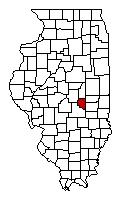|
DAVID C. CHASE. Age falls upon some men like a gracious benediction at the
end of the lesson of life. With whitened hair and measured tread, the venerable
aspect of age is an open hook in which even the youngest and most thoughtless can read the story
of life, whether the experience has been one of adventure, and colored and broidered o'er with
romance and tragedy, or whether adopting a fixed principle as a guiding star, the aged man has ever
steered his course by its guidance. Our subject has just passed his three-score years and ten, and
any one who looks upon his rugged but serene face can see therein that his has been an experience
guided by the principles of rectitude and honor; that no matter how frail the superstructure may
now be, that the base and foundation is of adamantine firmness; for character never grows old.
David C. Chase is a native of Indiana. His parents, however, both came from the Empire
State. His father was William J. Chase, and his mother Eunice (Chamberlain) Chase. They married
in Indiana, and settled immediately after their union in Washington County, where they
lived and made the journey of life together until death claimed them for its own. Our subject's
father was a shoemaker by trade, although he was engaged to some extent in farming, but his preference
was for the exercise of the trade that he had learned in youth. Both parents were victims of
the cholera, and both passed away in the month of August, 1833. They had six children and of these
our subject was the eldest.
The original of our sketch was born in Washington County, Ind., May 25, 1821. Left an
orphan at the age of twelve, he was obliged to struggle as best he could for a maintenance. He
went to Lawrence County, Ind., and there grew to manhood, learning in the meantime the blacksmiths'
trade, which he followed until 1852, and the imagination pictures the smithy at the meeting
of the roads, where farmers brought their horses, and over the injured tire of an ancient
vehicle, discussed crops and politics and every subject within the ken of the rural mind, "from
Homer down to Thackeray, and Swedenborg on hell." The fact remains, however, stripped of
fancy, that our subject succeeded in his work, receiving such returns for his labor as to justify
him in taking unto himself a companion and wife, which he did June 26, 1845, in Orange County,
Ind. His bride was Miss Hannah Hostetler, a daughter of Christian and Elizabeth (Hardman)
Hostetler. They had nine children, Mrs. Chase was the seventh in order of birth; she was born in Orange
County, Ind., December 1, 1823. In 1852 Mr. Chase and his wife came to Illinois, and settled in
Coles County, there living until January, 1853, when they came to Lovington Township, this
country, since which time he has here been a resident. He lived on his farm which he had purchased
upon first coming here, until the fall of 1885, when with his family he removed to the
village of Loviugton. He now rents his farm, which comprises one hundred acres of good land,
and it brings him in a very good income. Three children have grown up about our subject and his
wife. Elizabeth E. is the wife of Thomas Spilker; Francis M. married Miss Margaret Morthland;
and David C. took to wife Miss Mary Haley. Three children died in infancy.
Since coming to this State, Mr. Chase has followed agricultural pursuits, and has been reasonably
successful in his chosen calling. In politics he has ever taken an active interest, and is an ardent
adherent of the Democratic party, having very positive views in regard to the efficiency of
the governmental principles and rule of that power. Mrs. Chase, who is a kindly and intelligent
old lady, has been a member of the Christian Church since girlhood. Her husband is a Universalist
in his belief. Mrs. Chase is a sister of Noah Hostetler, of Lovington, of whom a more extended
history can be found in another part of this volume.
Portrait and Biographical Record of Shelby and Moultrie Counties, 1891 - p. 725/726
Transcription copyright 2003/2007, Moultrie County ILGenWeb/USGenWeb
|
